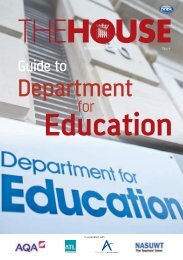Oracy
2fcBkno
2fcBkno
You also want an ePaper? Increase the reach of your titles
YUMPU automatically turns print PDFs into web optimized ePapers that Google loves.
Yet the school does not believe oracy<br />
always needs to be taught discretely.<br />
After year 7 it is embedded throughout<br />
the curriculum and at primary level, since<br />
class teachers work with the same pupils<br />
everyday, it is seen simply part of<br />
day-to-day practice:<br />
“In terms of creating a culture of talk in the classroom<br />
it’s a lot easier for a primary school teacher because<br />
you’ve got the same pupils all day so you can set up<br />
certain routines and practices that you can use across<br />
every single lesson”<br />
Amy Gaunt, Head of <strong>Oracy</strong> Primary<br />
Peter Hyman, the<br />
headteacher does not<br />
believe that teaching<br />
oracy discretely<br />
and embedding<br />
it throughout the<br />
curriculum are mutually<br />
exclusive. He explains,<br />
though, that teaching<br />
oracy separately<br />
can help it spread<br />
throughout a school:<br />
“One of the challenges for oracy … is that people think that because we speak we’re doing it<br />
anyway, and the thinking behind having a separate curriculum is that you do need structures<br />
that give it a boost and make teachers focus on it explicitly, and make students think … we<br />
are treating with the same status and recognition that you would with reading and writing”<br />
“We’re quite aware that as soon as anything is discrete the danger is that it doesn’t then<br />
transfer. People think, ‘I’ve done my speaking, I don’t need to use those same skills<br />
elsewhere’, but of course if you do it skilfully then they do transfer…. The single biggest way<br />
of doing that is using common language, so we’re using the four strands of oracy and every<br />
teacher’s aware of them, so every teacher can then be referring to them”<br />
“A discrete curriculum should be seen as a sort of pump priming…. If you had a discrete<br />
grammar lesson in English where you’re teaching systematically how to use an apostrophe<br />
you’d expect that to be seen in a history lesson”<br />
Peter Hyman, Executive Headteacher<br />
Introducing a discrete curriculum for oracy<br />
Chorlton High School in Manchester has introduced a discrete oracy curriculum for its year 7 cohort at<br />
the start of the 2016/17 academic year as part of its involvement with the EEF-funded trial of the Voice<br />
21 and University of Cambridge <strong>Oracy</strong> Framework. The <strong>Oracy</strong> Framework contains four elements, of<br />
which the discrete curriculum is one part. The four elements are:<br />
• An oracy curriculum, which includes dedicated oracy lessonsand body language<br />
• Strategies for building oracy into every lesson<br />
• Strategies for nurturing a whole school oracy culture, including building oracy into assemblies and<br />
parents’ evenings<br />
• An oracy assessment tool, which was developed in collaboration with Cambridge University and<br />
helps teachers to identify specific speaking and listening skills that pupils need to develop and<br />
monitor their progress.<br />
New year 7s receive one<br />
lesson in oracy a week and<br />
this is timetabled as part of<br />
their English lessons. Literacy<br />
and Language Coordinator<br />
Susannah Haygarth believes<br />
that the discrete curriculum<br />
will help raise the status of<br />
oracy throughout the school,<br />
and enhance pupils’ skills:<br />
“Because [oracy was] not embedded in the curriculum … it was<br />
something that people could forget to do, and [say], ‘oh yeah, I<br />
could have done that, I just didn’t because I got so bogged down<br />
in everything else’”<br />
“We’re training the teachers starting with English, [and] because<br />
we teach every single child between us … we’re hoping that …<br />
we will impact on every student eventually [because] our own<br />
knowledge of oracy seeping through into different lessons, that’s<br />
the idea”<br />
“Our target year is year 7…. We’re finding with year 7, because<br />
we’ve caught them straight away, they are just blossoming”<br />
Susannah Haygarth, Literacy and Language Coordinator<br />
54




